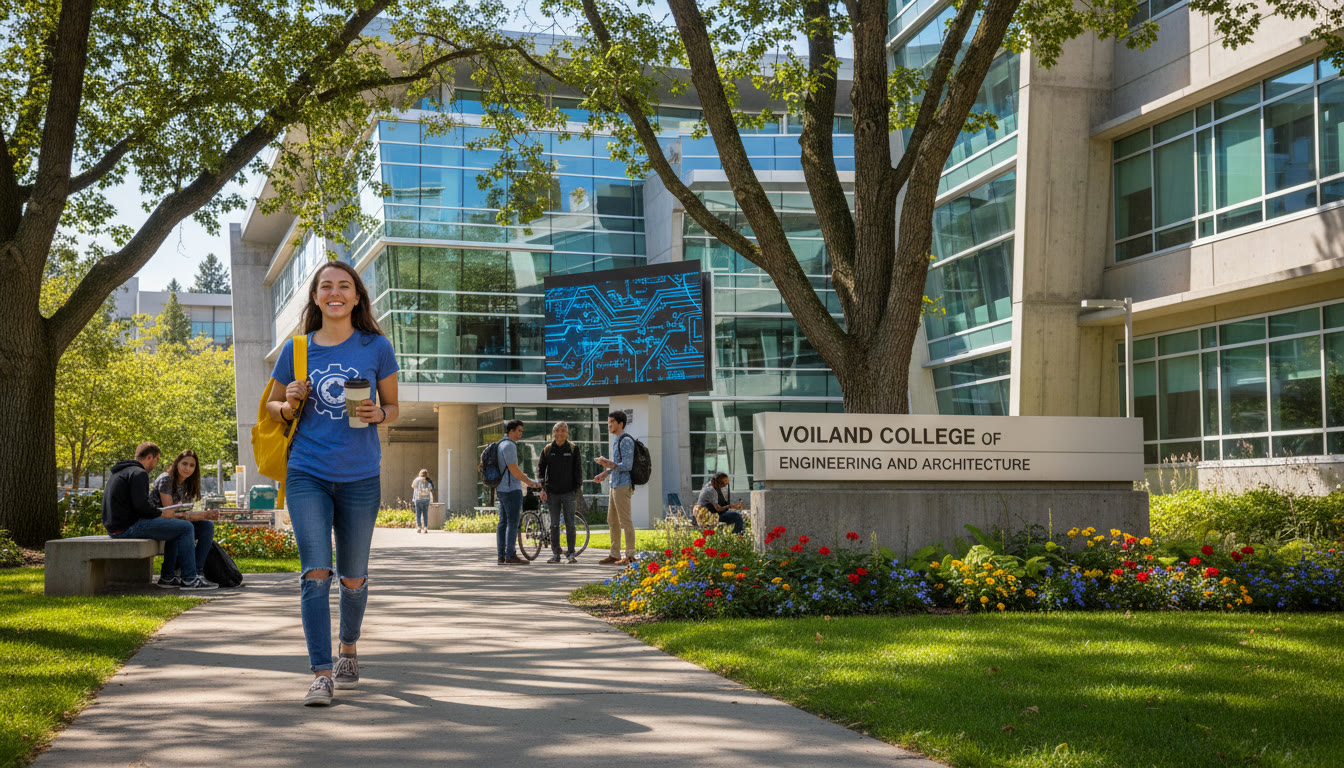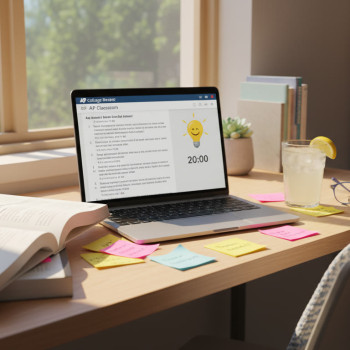Why AP Exams Matter — Especially If You’re Eyeing Voiland Engineering
If you’re a high school student (or a parent cheering one on) dreaming about the Voiland College of Engineering and Architecture at Washington State University, AP courses and exams are one of the clearest, smartest tools in your toolkit. They demonstrate academic readiness, can earn you college credit, and let you start high-level major work sooner — which matters in engineering programs where the first two years are often packed with required math, physics, and foundational engineering sequences.
This guide is for students who want practical, human advice — not a laundry list of facts. We’ll walk through which AP courses matter most, how AP scores translate into credit or placement, building a study plan, using AP strategically for stronger admissions chances, and how personalized help (like Sparkl’s 1-on-1 tutoring and tailored study plans) fits naturally into the journey.
Which AP Courses Are Most Valuable for Prospective Voiland Engineers?
Not all AP classes are created equal for aspiring engineers. Focus on AP exams that line up with the engineering curriculum and show admissions committees you’re ready for rigorous STEM work.
- AP Calculus (AB and BC) — Core. Calculus BC is ideal: it covers both single-variable calculus and the extra topics that mirror early college calculus sequences.
- AP Physics (1, 2, C: Mechanics, C: Electricity & Magnetism) — Physics C (with calculus) is most relevant for engineering majors since it uses math in the same way engineering courses do.
- AP Chemistry — Useful for certain engineering tracks and helps with general problem-solving skills.
- AP Computer Science A — Increasingly important: coding and computational thinking are central to modern engineering work.
- AP Statistics — Helpful for experimental work and data analysis; not always required but a strong complement.
- AP Environmental Science or AP Biology — Optional, but useful for specialized minors or interdisciplinary engineering work (e.g., environmental engineering).
How Colleges (Including Washington State) Typically Use AP Scores
Many colleges offer credit or advanced placement for AP scores — often a score of 3, 4, or 5. For engineering, departments sometimes set higher thresholds for granting credit that counts toward major requirements. The practical takeaway: check the school’s AP credit policy early, then plan which APs to take based on both what earns credit and what impresses admissions committees.

Translating AP Scores into a Smooth Start at Voiland
Getting college credit from AP exams can let you skip introductory classes and enroll sooner in higher-level engineering courses. That matters for Voiland students who want to:
- Start major-specific lab or design courses earlier.
- Free up schedule space for double majors, minors, undergraduate research, or internships.
- Graduate earlier or reduce tuition costs by lowering total credits required.
Keep two practical rules in mind: first, the fine print matters — individual departments decide whether an AP score satisfies a major requirement. Second, earning placement might not always be the same as earning credit — you could be allowed to skip a class but still need to take a departmental alternative to pick up required credit.
Sample Credit and Placement Scenarios
Here’s a simple table that shows typical ways AP scores map to college outcomes. Use it as a model, then check the specific policy of the department at Washington State (or any other school) you plan to attend.
| AP Exam | Common Score for Placement | Typical College Outcome |
|---|---|---|
| Calculus AB | 3–4 | Placement into Calculus II or credit for Calculus I depending on department |
| Calculus BC | 4–5 | Credit for Calculus I and II; placement into multivariable calculus or next-level engineering math |
| Physics C: Mechanics | 4–5 | Placement into physics II or credit for introductory physics used in engineering |
| AP Computer Science A | 3–5 | Credit or placement into intro coding courses; helpful for programming-heavy majors |
How to Build an AP Course Plan That Strengthens Admission Chances
It’s tempting to pile on every AP your transcript can handle. Instead, think strategically: depth and relevance beat scattershot volume. Admissions officers and engineering departments value students who demonstrate readiness in math, physics, and problem-solving.
Year-by-Year AP Roadmap (Sample)
- Freshman Year — Focus on a strong academic base. Take honors or pre-AP math and science classes. Build study habits and time management.
- Sophomore Year — Take your first AP (e.g., AP Computer Science A or AP Statistics) if you’re ready. Continue advanced math progression (Algebra II/Trig or Precalculus).
- Junior Year — Take AP Calculus (AB or BC) and AP Physics 1 or AP Physics C if you have calculus. These demonstrate readiness for engineering rigor and look great on an application.
- Senior Year — Take advanced options or APs that align with interests (AP Chemistry, AP Physics C if not yet taken, AP Calculus BC if you started with AB). Use APs to deepen knowledge for the major and show sustained rigor.
Tip: Admissions teams prefer a consistent upward trajectory. If you couldn’t take AP Calculus early, a strong performance in Calculus as a senior still signals commitment — but earlier is better.
Study Strategies That Work — From Real Students, Not Just Study Guides
Preparing for AP exams is both an intellectual and emotional exercise. Balancing content mastery with test skills, time management, and stress control is essential. Here are practical strategies that students who succeed often use.
Active Learning Over Passive Repetition
- Practice problems first: struggle with a problem before reading the solution. The “desirable difficulty” helps retention.
- Teach a peer (or imaginary class): explaining a concept aloud reveals gaps and solidifies understanding.
- Space out practice: short, focused sessions over weeks beat all-night cramming.
AP Exam-Specific Tips
- AP Calculus: Focus on problem sets that mix context-based applications (mechanics, rates of change) with straightforward procedural tasks.
- AP Physics C: Translate physics problems into math. Practice deriving equations from first principles; units and approximations matter.
- AP Computer Science A: Build small projects. A portfolio of tiny apps or programs shows practical skill beyond multiple-choice tests.
Mock Schedules: How to Balance AP Work, Extracurriculars, and Life
Engineering applicants are expected to be motivated, but not burned out. Here’s a week-in-the-life plan that balances study with meaningful extracurriculars and rest.
| Time | Activity |
|---|---|
| 6:30 AM – 8:00 AM | Morning routine, quick review flashcards (20–30 minutes) |
| 8:00 AM – 3:00 PM | School (AP classes, labs, group work) |
| 4:00 PM – 6:00 PM | Homework block: hardest subject first (e.g., calculus problem sets) |
| 6:00 PM – 7:00 PM | Extracurriculars or robotics club — hands-on engineering time |
| 7:30 PM – 9:00 PM | AP study session or tutoring session (targeted practice) |
| 9:30 PM | Wind down, light reading, sleep hygiene |
How Tutoring and Personalized Support Can Make the Difference
Many students find that focused, personalized support accelerates progress. Generic classroom pacing doesn’t always match individual needs. That’s where 1-on-1 tutoring — like the kind Sparkl provides — can be transformative. Personalized tutoring offers:
- Targeted review of weak topics (e.g., multivariable calculus prerequisites).
- Tailored study plans that align with the AP syllabus and your test date.
- Expert tutors who explain concepts in multiple ways until they click.
- AI-driven insights that highlight mistakes and track improvement over time.
When used well, tutoring isn’t about doing the work for you — it’s about coaching you to approach problems strategically and build confidence. For many students aiming for competitive engineering programs, these gains translate into higher AP scores and stronger college applications.

Beyond AP Scores: Building an Application That Speaks Engineering
AP scores matter, but Voiland (and similar engineering colleges) evaluate applicants holistically. Here’s how to complement strong AP work with experience that signals genuine engineering interest.
Meaningful Extracurriculars
- Robotics, Maker Clubs, or Engineering Competitions — Hands-on work shows initiative and practical skill.
- Research or Independent Projects — A small research project, science fair entry, or a self-designed engineering challenge demonstrates curiosity and perseverance.
- Internships or Shadowing — Real-world exposure to engineering fields helps you write richer application essays and decide your specialization.
Personal Essays and Recommendations
Your essay should do more than list achievements. Tell a story: what problem did you try to solve? What did you learn when your design failed? How did collaboration or iteration change your approach? Teachers who see your growth in class can be powerful recommenders — especially science or math teachers who can speak to your analytical skills.
AP Scores, Credits, and Course Planning at Washington State
Washington State University supports AP credit and placement, and many prospective Voiland students use AP results to advance in math and science sequences. The specifics of which score maps to which course can vary by department — and sometimes by the year — so it pays to check departmental guidance early and plan accordingly.
Before you finalize your fall schedule as a freshman, connect with an academic advisor in the Voiland College. Bring your AP score report so you can get clear, actionable recommendations about which classes to place into or skip — and understand how that affects your long-term degree plan.
Smart Questions to Ask an Advisor
- Which AP exams and minimum scores satisfy requirements for my intended major?
- If I place out of an introductory course, how will that affect prerequisite chains later on?
- Can I use AP credit to pursue a minor or double major without overloading my schedule?
- Are there departmental exams or placement tests that can further refine my course placement?
Common Mistakes and How to Avoid Them
Students aiming for engineering often make predictable errors that cost time or opportunity. Avoid these pitfalls:
- Assuming All AP Credits Transfer the Same Way: Departments differ. Verify before relying on AP credit to skip courses.
- Taking Too Many APs Too Soon: Depth matters. Choose APs that reinforce your major track and your ability to score highly.
- Neglecting Soft Skills: Engineering is collaborative. Communication, teamwork, and problem-solving in complex settings matter on applications and in class.
- Waiting Too Long To Send Scores: Follow deadlines for free score sends; check college deadlines for receiving AP reports.
Practice Resources and How to Use Them Efficiently
Not all practice is equally valuable. Here’s a triage method for efficient prep:
- Begin with official practice problems and past exam questions to understand format and item types.
- Use topic-focused problem sets to strengthen weak areas (e.g., integration techniques in calculus).
- Simulate exam conditions at least twice before test day to build timing and stamina.
If you’re working with a tutor, ask them to run timed full-length practice exams and to analyze your mistakes by category — conceptual errors, careless arithmetic, misreading prompts, and time-management issues. That breakdown is gold for targeted improvement.
Final Months: From Practice to Performance
As AP exams approach, taper content acquisition and focus on consolidation. Prioritize the following:
- Quality over quantity in practice — fewer, deeper problem sets are better than many half-finished ones.
- Target weak areas identified in prior practice exams.
- Polish free-response practice: structure responses clearly and practice partial-credit approaches.
- Manage sleep, nutrition, and micro-rest — cognitive performance depends on rest as much as review.
Many students find that short, focused tutoring bursts in the final months — for example, 1-on-1 sessions that simulate exam conditions and provide immediate feedback — give disproportionate gains. Sparkl’s personalized tutoring model works well here because it adapts quickly to the student’s evolving needs and uses progress data to emphasize the most impactful topics.
Putting It All Together: A Practical, Personalized Path
Here’s a short checklist you can use over the next 12 months to keep progress consistent and manageable:
- Map target AP exams to Voiland’s major requirements.
- Create a year-long study plan with milestones (content blocks, timed practices, review weeks).
- Schedule regular check-ins with a mentor, counselor, or tutor to adjust pacing.
- Build extracurricular projects that show applied engineering interest.
- Confirm score-send deadlines and plan free score sends accordingly.
Closing Thoughts — The Long View
Pursuing Voiland Engineering is a marathon of consistent curiosity, well-focused work, and meaningful experience. AP coursework and exams are powerful accelerants — they help you learn more, demonstrate readiness, and sometimes earn credit that reshapes your college timeline.
Remember: the goal isn’t just to collect scores. It’s to learn how to think like an engineer — to define problems, test solutions, learn from failure, and communicate results. If you pair AP preparation with purposeful projects and smart support (including tailored tutoring and study plans where helpful), you’ll position yourself not only to be admitted but to thrive once you arrive.
Good luck — and remember: steady, thoughtful progress wins. Use the tools that fit you, ask for help when you need it, and keep building things that make you curious.















No Comments
Leave a comment Cancel